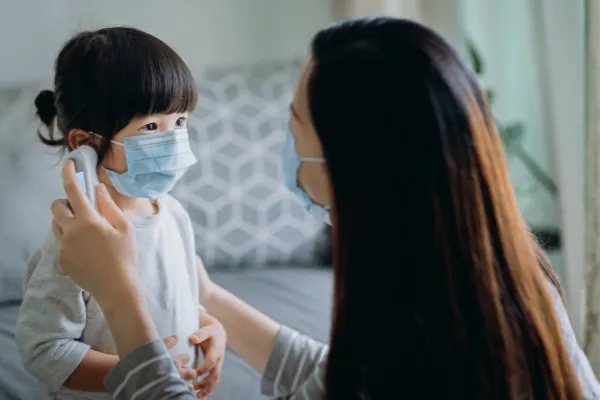Topics
Shingles, also known as herpes zoster, are caused by the varicella-zoster virus reactivating, which also leads to chickenpox. After recovering from chickenpox, the virus stays inactive in the body’s nervous system and has the ability to become active once again in the future, specifically if the body’s immunity weakens. Shingles can leave chronic health effects to a person, especially for older individuals or people with weak immune systems. This article will reveal the different chronic effects of shingles that people may experience.
1. Shingles elevates risk of long-term nerve pain.
Neuralgia postherpetic is a condition where the nerve pain persists even after the shingles rash has healed, it is one of the key chronic effects of shingles. This pain can cause notable long-term pain, interfering with an individual’s quality of life, and in more severe cases, individuals can experience pain that persists for years. Postherpetic neuralgia normally happens to the elderly, but it can also impact younger individuals if their shingles condition is not treated properly.
2. Shingles rash can lead to risk of secondary skin infection.
Blisters and itchy sores can be caused by a shingles rash, and once scratched, the risk of secondary skin infections can occur due to its exposure. Secondary infections such as cellulitis or impetigo may need antibiotic treatment and close wound care. Good skin care and using antiseptic creams can help prevent secondary infections. Dermatologists at Pantai Hospitals provide helpful advice and treatment to decrease the risk of skin infection for individuals with shingles.
3. Shingles in the eye area can lead to vision complications.
When shingles show up on the face, specifically around the eyes, it can cause severe complications such as optic nerve inflammation and cornea infection. This can lead to blurred vision, corneal scarring, or in more severe cases, the risk of losing your vision permanently.
4. The risk of cardiovascular diseases such as heart attack and stroke are elevated.
Studies reveal that people who experienced shingles are at a more elevated risk of developing heart attack and stroke, specifically in the initial years after a shingles infection. This is caused by blood vessel inflammation initiated by the varicella-zoster virus, which can damage artery walls and elevate the risk of atherosclerotic plaque formation. The risk of cardiovascular disease can be a factor that threatens the long-term health of young patients and those who have shingles.
5. Shingles can result in hearing and balance issues.
Shingles, in certain cases, can target the nerves that control both hearing and balance, causing health complications such as vertigo, tinnitus, or hearing loss. This condition is called the Ramsay Hunt syndrome, which happens when shingles impacts the nerves in the face and ears. Patients with this syndrome may experience balancing issues and difficulty hearing, which can interfere with quality of life and the ability to work or commit to everyday activities. At Pantai Hospitals, neurological treatment and physiotherapy are available to aid patients in managing these problems, and help them restore both their balance and hearing.
6. Shingles affect both the nervous system and cognitive function.
The varicella-zoster virus that results in shingles can potentially infect the central nervous system and lead to brain inflammation, or encephalitis. These complications can be severe and lead to cognitive impairment, such as memory loss, confusion, or seizures, although it is a rare occurence. The risk of encephalitis is higher in people with low immunity, such as cancer patients or those going through immunosuppressive treatment. Neurologists at Pantai Hospitals have high expertise in treating neurological complications because of shingles, and providing further care for affected patients.
FAQ About Shingles
1. Can shingles return after healing?
Yes, although an uncommon occurrence, shingles can return specifically if the body's immunity is low.
2. How can I decrease my risk of getting shingles?
Vaccination against herpes zoster can aid in preventing shingles, specifically for individuals past 50 years old.
3. What are the initial symptoms signalling that shingles may happen?
Initial signs include a burning feeling or pain on one side of the body before the rash occurs.
4. Is shingles contagious to others?
Shingles is not contagious, but the varicella-zoster virus in the blisters can lead to chickenpox in individuals who were not infected by the virus, or unvaccinated.
Schedule an Appointment at Pantai Hospitals
Shingles, or herpes zoster, can have a severe impact on health, causing symptoms such as chronic nerve pain, vision problems, hearing impairment, and cardiovascular complications. If you or a loved one has shingles symptoms, seek medical help immediately to prevent long-term effects. Early diagnosis and treatment with antivirals can reduce the risk of more severe complications.
If you are concerned about shingles or need guidance on managing your symptoms, please reach out to your nearest Gleneagles Hospitals by making an appointment through our website, or download our MyHealth360 application from Google Play Store or Apple App Store.
Pantai Hospitals have been accredited by the Malaysian Society for Quality in Health (MSQH) for its commitment to patient safety and service quality.













